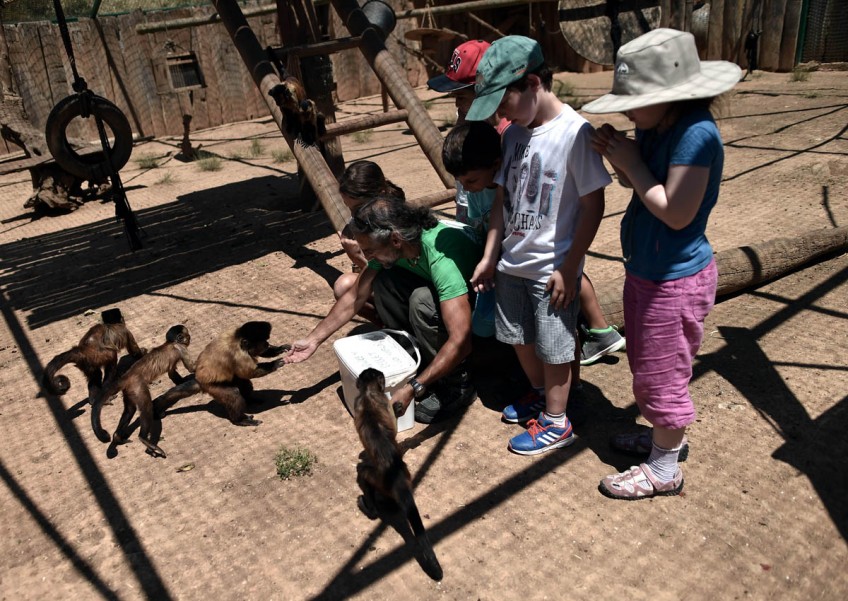From cats to rhinos, Greek crisis takes toll on animals

ATHENS - Hundreds of cats are loose on the streets, and food is running low for some residents of Athens' zoo. It isn't just humans who are suffering as Greece tries to claw its way out of economic crisis.
"I'll have to call the bank again," sighed Jean-Jacques Lesueur, the founder of Athens' only zoo.
The Frenchman had been trying for days to place a 6,000 euro ($6,600) order of frozen fish for the zoo's six dolphins. Without fresh supplies from abroad, he feared he would have to put them on a diet.
Normally the order would be simple enough, but Greece imposed strict capital controls on June 29 as panicked account holders began emptying the nation's banks.
The measures have stopped the flight of cash from the debt-crippled country - but in doing so have made life extremely difficult for Greek firms that do business abroad.
All bill payments to foreign countries must be approved by a government commission, a process that is proving so slow that distrustful suppliers are now asking Greek firms to pay in advance.
Lesueur, who is in his seventies, finally managed to get the dolphin food payment approved late Thursday. But he's still unable to pay for a shipment of mealworms, beloved of the zoo's two giant anteaters, and nutritional supplements for the rhinos.
"They eat a kind of local clover, but we also feed them special imported biscuits," Lesueur told AFP as he watched the three rhinos lazing under a tree. "Provisionally we might be able to give them horse biscuits, but it isn't ideal."
The zoo feeds most of its animals with local meat and vegetables, but it also spends some 80,000 euros (S$120,000) a year on imported food for its more fussy residents.
Lesuer said the amount may sound like "peanuts", but for some species, "it's a question of life or death."
The dolphins eat fatty fish impossible to find in Greece. Then there's the anteaters, who love digging their snouts into a special imported powder that replaces the termites they would eat in the wild.
A gaggle of delighted toddlers watched as the two large creatures snacked on some worms. The zoo, under the slogan "we stay together during tough times," is offering free entry to children this summer on weekdays.
But Lesueur has had to increase ticket prices for adults after tax rises took effect this week as part of tough reforms demanded by Greece's creditors as Athens seeks a bailout worth up to 86 billion euros ($94 billion) over three years.
Persian cats abandoned
In a park in central Athens, Cordelia Madden-Kanellopoulou looked down and exclaimed to a black cat at her feet: "Hello beauty, who are you?" The feline was a new addition to the group that the Englishwoman, who is married to a Greek, feeds along with other volunteers from the charity Nine Lives.
Their members, many of them elderly Athens residents, feed around 450 stray cats in the Greek capital.
"What we really see more are pedigree cats being dumped," Madden-Kanellopoulou explained over a chorus of plaintive mewing. "A few years ago there really was money in Greece - people started buying these expensive cats, like Persians. Now they cannot face the costs, or they don't want to - the vet, the grooming - so they dump them."
With a quarter of the population unemployed, few Greeks want to adopt abandoned cats. The charity relies "quite a bit on expats," Madden-Kanellopoulou said as she reached into a bag of cat food.
"But with the crisis, more and more of those leave Greece." Strays are a common sight in this country. Loukanikos, a sandy-coloured stray dog whose name means 'sausage', became an unofficial mascot to anti-austerity riots in Athens in 2010 as he charged alongside protesters.
Evgenia Mataragka, of the charity Animal Action Greece, said she had seen a "huge increase" in the number of abandoned pets over the last six months.
"In big cities they do not starve usually," she said. "But on the islands, especially for the cats, it is difficult. Once the tourists are gone, many die of starvation." Others get poisoned when they eat things they shouldn't, she added.
The cats are not neutered, said Mataragka, contributing to an explosion in the stray population.
Both Nine Lives and Animal Action Greece are increasingly turning to foreign donors. "In Greece we all have problems. Nobody can help," said Mataragka.